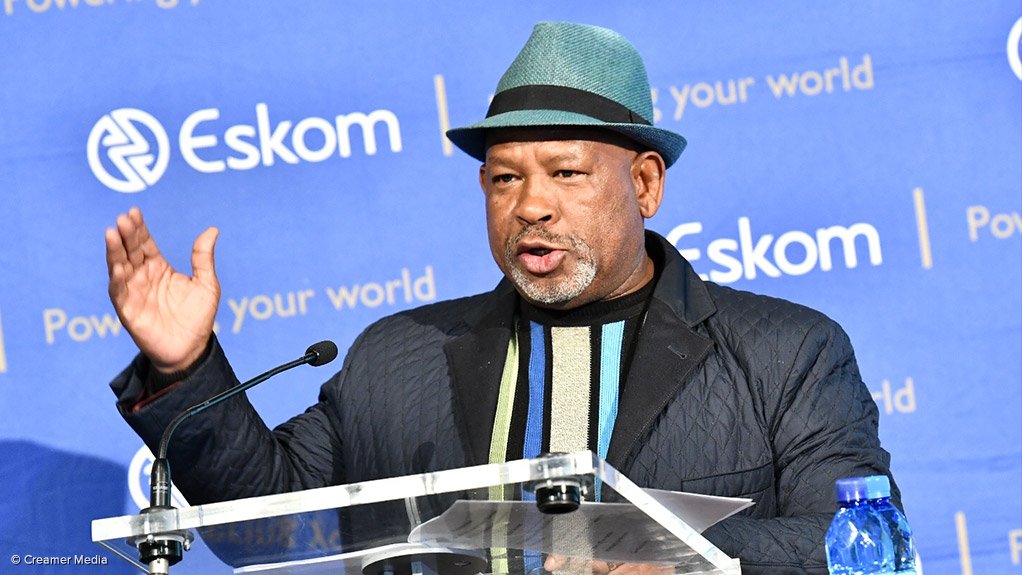South Africa’s cash-strapped electricity utility Eskom is considering far-reaching changes to its business model as part of an in-depth review, being undertaken ahead of the finalisation of a new corporate plan.
Chairperson Jabu Mabuza already flagged this week that the new corporate plan, which is scheduled for finalisation in September, will be significantly different from past plans, describing it as “a total review of the entire business model”.
Without providing detail, Mabuza indicated that the operating model could affect Eskom’s vertically integrated structure, which currently incorporates generation, transmission, system operations and distribution.
“It would be inappropriate for me to start sharing where our headspace is with regards to the whole issue of system operations,” Mabuza said, noting that the review was not yet finalised. However, it would address every component of the group’s balance sheet and income statement.
Eskom, he added, would also have to address the cost of primary energy, as well as the fact that its 48 000-strong workforce was estimated to be one-third too large for the nature of its operations and its output, which has remained flat for more than ten years.
Mabuza’s statements were subsequently elaborated upon by group executive for generation Thava Govender, who hinted that an independent system operator might be required to enable South Africa and Eskom to navigate the energy transition.
Speaking at a Brics Business Council energy event in Sandton on Wednesday, Govender said the transition had material consequences for Eskom’s business model.
“Changing Eskom’s business model is one of the fundamental issues that needs to be tackled fairly urgently,” he said, stressing that the utility was not immune to the so-called ‘death spiral’, which had afflicted utilities globally as distributed renewable-energy generators played an increasingly prominent role in electricity supply.
He said South Africa was behind the energy-transition curve and that leadership and political will were critical to ensuring South Africa was more aligned to the transition.
“Some of the changes that need to happen impact directly on Eskom. This issue of Eskom being the single buyer certainly needs to be relooked at from an energy policy point of view, and the independent system operator, which is a model that is being looked at, will unlock a lot of issues,” Govender said.
Currently Eskom is designated as the single buyer of all electricity produced from utility scale independent power producers (IPPs) and remains a near monopoly force in the electricity supply industry.
For a number of years, observers have been calling for the separation of system operations from Eskom, describing it as a necessary condition for levelling the playing field for IPPs in a generation system still dominated by Eskom’s coal-fired power stations.
Govender said Eskom was convinced that South Africa required a diverse energy mix. “The more diverse the energy mix is, the greater the energy security will be,” he said, while also emphasising the need for South Africa to pursue a least-cost mix.
The need for the utility to adapt to the energy transition was endorsed by various other presenters at the energy event, including former Eskom CEO Brian Dames, who is currently a co-chair of the Brics Business Council’s Energy and Green Economy Working Group.
Dames said electricity systems globally were on the cusp of a major transformation, which was likely to result in greater decentralisation and a decline in the importance of traditional utilities.
“Their revenue models are exposed to a death spiral of flattening demand and generation from decentralised units and decentralised grids.”
However, Dames said utilities might also emerge as indispensable “stewards” of future “intelligent wires systems”, which would help interconnect and manage decentralised generators.
“This tsunami of the energy transition . . . brings hope, but it also generates fear and uncertainty and it is for us, as energy professionals and leaders, to make sure that we direct this transition by ensuring we have tangible levels of appropriate investment in many of our countries.”
Dames announced that the Brics Business Council’s Energy and Green Economy Working Group had proposed the creation of a ‘clean energy fund’ under the aegis for the New Development Bank to support higher levels of investment in Brics countries.
EMAIL THIS ARTICLE SAVE THIS ARTICLE ARTICLE ENQUIRY
To subscribe email subscriptions@creamermedia.co.za or click here
To advertise email advertising@creamermedia.co.za or click here











